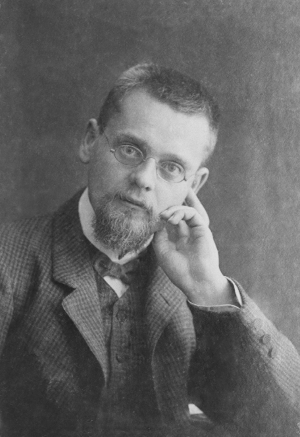1.9: C.9- Ernst Zermelo
- Page ID
- 121771
Ernst Zermelo was born on July 27, 1871 in Berlin, Germany. He had five sisters, though his family suffered from poor health and only three survived to adulthood. His parents also passed away when he was young, leaving him and his siblings orphans when he was seventeen. Zermelo had a deep interest in the arts, and especially in poetry. He was known for being sharp, witty, and critical. His most celebrated mathematical achievements include the introduction of the axiom of choice (in 1904), and his axiomatization of set theory (in 1908).
Zermelo’s interests at university were varied. He took courses in physics, mathematics, and philosophy. Under the supervision of Hermann Schwarz, Zermelo completed his dissertation Investigations in the Calculus of Variations in 1894 at the University of Berlin. In 1897, he decided to pursue more studies at the University of Göttigen, where he was heavily influenced by the foundational work of David Hilbert. In 1899 he became eligible for professorship, but did not get one until eleven years later—possibly due to his strange demeanour and “nervous haste.”
Zermelo finally received a paid professorship at the University of Zurich in 1910, but was forced to retire in 1916 due to tuberculosis. After his recovery, he was given an honourary professorship at the University of Freiburg in 1921. During this time he worked on foundational mathematics. He became irritated with the works of Thoralf Skolem and Kurt Gödel, and publicly criticized their approaches in his papers. He was dismissed from his position at Freiburg in 1935, due to his unpopularity and his opposition to Hitler’s rise to power in Germany.
The later years of Zermelo’s life were marked by isolation. After his dismissal in 1935, he abandoned mathematics. He moved to the country where he lived modestly. He married in 1944, and became completely dependent on his wife as he was going blind. Zermelo lost his sight completely by 1951. He passed away in Günterstal, Germany, on May 21, 1953.

Further Reading
For a full biography of Zermelo, see Ebbinghaus (2015). Zermelo’s seminal 1904 and 1908 papers are available to read in the original German (Zermelo, 1904, 1908). Zermelo’s collected works, including his writing on physics, are available in English translation in (Ebbinghaus et al., 2010; Ebbinghaus and Kanamori, 2013).


